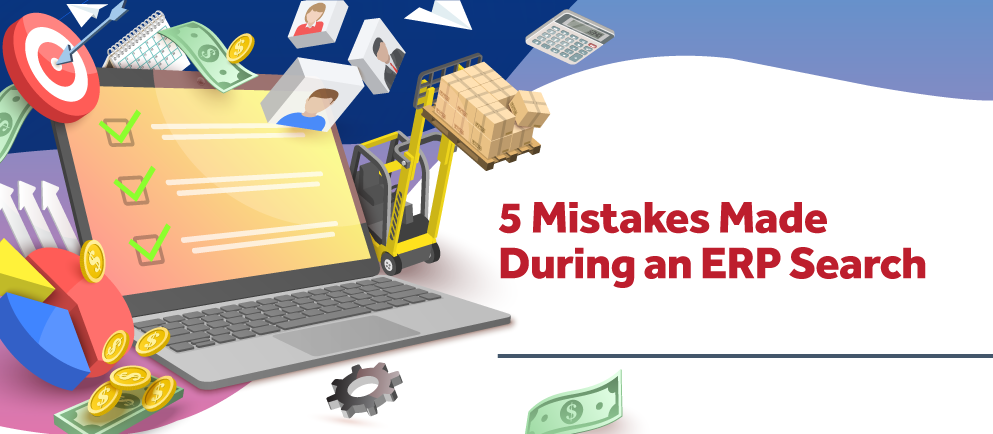5 Mistakes Made During an ERP Search

Selecting and implementing an Enterprise Resource Planning (ERP) system is a complex and critical process for any size professional services firm. Those investing in an ERP need to understand it can take significant time and is a decision that will impact your firm for many years if not decades. Here are five common mistakes made during an ERP search and our advice on avoiding them.
#1 Insufficient Needs Assessment
Mistake: Failing to thoroughly understand and document the professional services firm's specific business requirements and needs. It’s important to keep the “end in mind.” What are your long-term goals? How will you know if this project is successful or not? “Easier” isn’t a real goal. Easy is subjective. Business requirements should be Specific, Measurable, Achievable, Relevant, and Time-Bound (SMART GOALS AND OBJECTIVE SETTING).
Consequence: Choosing an ERP system that doesn't align with the organization's unique processes both current and future needs, leading to inefficiencies and potential failed implementations. It is very important to be on the same page across the entire firm. The firm needs to come together as one, and not have fragmented processes for an ERP implementation to be successful.
Our Advice: Make sure that every department (from business development to project tracking to forecasting to billing) has their needs documented. Understand where there are inefficiencies and where you need improvement. What measurable results are you looking for from those improvements?
#2 Lack of Executive Involvement
Mistake: Not having strong executive sponsorship and involvement throughout the entire ERP process. This includes the evaluation process, selection, kick-off, key milestones, and ongoing commitment to improvement. Change Management really starts with the leaders of the company. As we all know, change is not always easy. Having leadership be an advocate and having strong communication downstream will ensure you reach the “end in mind.”
Consequence: Lack of commitment from top management may result in inadequate resources, funding, and overall support for the ERP project, increasing the risk of failure. Executive involvement can ensure that all departments are aligned and that everyone can see the bigger picture.
Our Advice: Ensure C-Suite is involved throughout the evaluation process, so they can be an advocate during the implementation, and they share the strategic vision and benefits this will bring to your professional services firm.
#3 Inadequate Vendor Evaluation
Mistake: Rushing the vendor selection process or not thoroughly evaluating potential ERP vendors. Many vendors can seem similar on the surface. Taking the time to dive into specific differentiators and finding the vendor that is best suited for your needs is important.
Consequence: Choosing a vendor without considering factors such as financial stability, support capabilities, industry expertise, and long-term viability, can lead to problems during implementation and ongoing use.
Our Advice: Make sure to consider your ERP vendor as a long-term partner. Make sure the ERP can grow with your professional services firm and that you have established strong relationships with the organization and consultants that will implement your software. Some questions to ask yourself:
- ✓ Do the vendor and the consultants understand your business?
- ✓ How long has this ERP provider been in business? Is ERP their primary focus?
- ✓ Are there user groups and other references of similar companies?
#4 Overlooking Change Management
Mistake: Underestimating the importance of change management and employee training. This can mean different things to different departments. Some employees or departments may be affected more than others, and it is important to understand the micro level of the impact that any change may have.
Consequence: Resistance from employees, lack of user adoption, and increased likelihood of project delays or failure due to insufficient preparation for the organizational changes associated with ERP implementation. If users do not see the benefits of change, they might look at it as additional or unnecessary work.
Our Advice: Making sure to have executive involvement throughout the evaluation and implementation will help with change management a ton. Consistent reminders of the benefits this will bring both to your professional services firm and to each specific role are critical for the full adoption of a new ERP.
#5 Not Understanding the Time and Resource Commitment
Mistake: Focusing solely on upfront costs and not considering the long-term expenses associated with ERP implementation and maintenance. ERP is not a “one-and-done” investment. Consistent monitoring and evaluation of your internal processes is critical to stay on track with your long-term goals.
Consequence: Unexpected costs, and challenges in maintaining the ERP system over time, impacting the overall return on investment. Depending on how the software is deployed (SaaS vs. On-Premise), there are different ongoing costs to consider.
Our Advice: Have in mind who will be the champions of the implementation. Having a strong Project Coordinator will ensure things go smoothly. Training doesn’t end when you go live. You need to anticipate some ongoing training, periodic refreshing, and of course, new hire training. Think about questions like will there be an internal “power user” to conduct these, or will you be looking to hire consulting for this?
Carefully Tread When Doing the ERP Search
The choice you make for an ERP for your professional services firm is a decision that will greatly affect your firm down the road and must be done thoughtfully. To avoid these common mistakes when searching, organizations should invest time in comprehensive planning, involve key stakeholders, conduct thorough vendor evaluations, prioritize change management, and carefully assess the total cost of ownership throughout the ERP search and implementation process. Need help figuring out which ERP you should use? Let us give you a hand!


